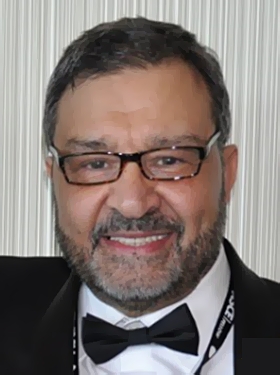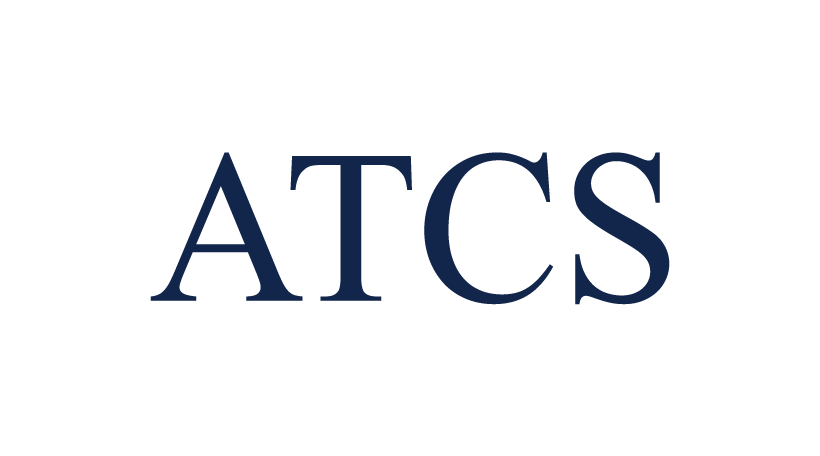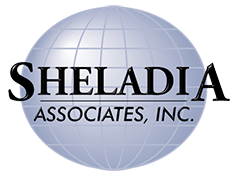A New Record: Columbia University Gives Five Scholarships to One University in the Washington Metro Area
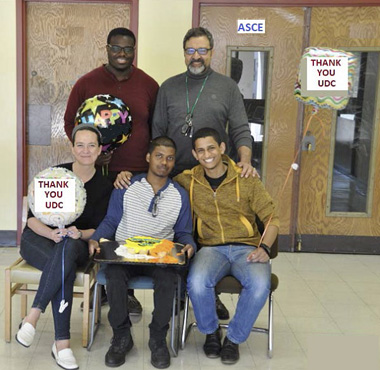
When I remember the 1994 Tom Hanks movie Forrest Gump, I always smile. In the movie Tom Hanks said “My mom always said life is like a box of chocolates. You never know what you’re gonna get.” I think this is very true in academia as well. I’ve been in academia for more than 40 years and have worked as a project engineer, researcher and professor in Europe and Japan before moving to Washington, DC. Throughout my career, I’ve consider myself to be a very fortunate college professor since I have been honored by numerous local, regional and national awards from various engineering organizations and universities, including my own institution.
(Photo: Scholarship Winners from Columbia University: All of them are Civil Engineering students from UDC. Standing from left: Kwame Baah and Dr. Z. Seated from left: Patricia Wolfbauer, Suraj Narain and Brahim Sidi M’Hamed. Not shown: Andrew Asiimwe)
While these honors and accolades are meaningful, nothing gives me more joy than seeing my students achieve significant milestones in their preparation and careers. And today, I’ve decided to write about some of our students; who they are, what they do and why they are so unique?
Is it possible to inspire, motivate, and transform a sanitary worker from Washington, DC to ultimately become a structural engineer designing the Boeing 787 Dreamliner? Hard to believe, but this was a true story. As many of our readers know, I have been offering pro-bono Saturday classes at UDC that are open to all engineering students and practicing engineers from the DC metro area who may be preparing for their FE and PE exams. These highly-intensive, informal sessions, some call “Boot Camp,” present a two-way opportunity to learn from the students about their professional goals, dreams, aspirations and sometimes even their daily struggles and challenges and help them academically and prepare them to be successful and productive engineers and citizens. Editor’s note: find all of Dr Z’s practice problem sets, including this month’s, here.
About two years ago an engineering student from my Saturday class told me, “Dr Z, I would not hesitate to tell you that when I’m not at school, I work at a small restaurant on Georgia Avenue. I’m working there as a dishwasher and making minimum wages. It may sound strange to tell others what I do for living, but I am proud. I work very hard to help my family. My father is not working and my mother is sick; therefore I have to work to help them. Washing dishes helps me to go to school, get my education, and take care of my family.” And another said that to support myself and pay my tuition, I have to deliver pizza until 4 a.m. Every day I sleep for a few hours and then come to school and study. For us, these are amazing stories of dedication, values, priorities, and grit.
And the great news is, two months ago we were thrilled to learn that five UDC students, four of them Civil Engineering Students, all from Dr. Z’s Saturday classes, have received full scholarships, including tuition and housing, to pursue their graduate studies at Columbia University. This great honor is a testament not only to their extraordinary academic and co-curricular achievements but also to the quality of the engineering education that students receive at the University of the District of Columbia. By the way, the student working at a restaurant and the otehr delivering pizza until early in the morning were of course among those that received prestigious scholarships from Columbia University.
That reminded me my brief remarks during a national award ceremony back in July 2015 in Seattle. At the podium, speaking to educators and engineers from all over the country and also executives from Microsoft and Boeing:
“UDC is a small university in the nation’s capital. This prestigious award is truly a testament that while we often take a different approach, when it comes to inspiring, motivating and most importantly, educating students – our future engineers – The University of the District of Columbia is unquestionably one of the best in the nation. While our program may be small, it is mighty! It is a transformative opportunity to change lives, broaden the field, and help engineering students achieve their dreams.”
Until next time,
Ahmet Zeytinci, P.E.
This email address is being protected from spambots. You need JavaScript enabled to view it.
Only one thing is better than being an engineer: being a Professional Engineer (PE)
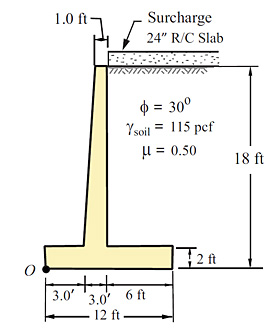
Every month Dr Z’s Corner receives many questions from students and engineers about the Fundamentals of Engineering (FE) and Professional Engineer (PE) exams and this month we would like to give a brief overview of these exams, including some new test formats.
Clean water, sound structures and safe power. Professional Engineers are charged with preserving these and many more fundamentals that protect the health, safety, and welfare of the public. In other words Professional Engineers help make us healthier, keep us safer and allow all of us to live better lives than ever before. Earning your license and joining the community of professionals committed to excellence will definitely change your life! And the first step in this journey is to take the FE exam. The National Council of Examiners for Engineering and Surveying (NCEES) develops and scores all the FE, PE, and SE exams for engineering licensure in the United States.
Fundamentals of Engineering (F.E.) Exam
The Fundamentals of Engineering (FE) exam is generally your first step in the process to becoming a professional licensed engineer (PE). It is designed for recent graduates and students (seniors) who are close to finishing an undergraduate engineering degree from an EAC/ABET – accredited program. The FE exam is a computerbased
test (CBT) administered yearround at NCEES-approved Pearson VUE test centers.
The FE exam is closed book with an electronic reference and includes 110-questions. The exam appointment time is 6 hours long and includes: Nondisclosure agreement (2 minutes), tutorial (8 minutes), and actual exam a 25-minute scheduled break. For FE exams, the most current version of the appropriate NCEES-supplied reference handbook (v.9.4) will be supplied onscreen as a searchable PDF. All NCEES examinees will use a 24-inch monitor while testing to allow sufficient space to display both the exam questions and the reference handbook.
FE Exam Disciplines
The FE is offered in seven disciplines as follows: FE Chemical, FE Civil, FE Electrical and Computer, FE Environmental, FE Industrial and Systems, FE Mechanical and FE Other Disciplines.
Starting July 1, 2017, the computerbased FE introduces a new testing component called Alternative Item Types (AITs). AITs are questions other than traditional multiple-choice questions. The exam fee is $225 and payable directly to NCEES.
Registering for the exam is quite simple: You can register for the FE exam by logging in to your MyNCEES account and follow the onscreen directions.
Professional Engineering (PE) Exam
The PE license is the highest standard of professionalism in engineering.
The PE exam is designed to test for a minimum level of competency in a particular engineering discipline. It is designed for engineers who have gained a minimum of four years of work experience in their chosen engineering discipline. The SE exam is designed for engineers who practice in jurisdictions that license structural engineers separately from other professional engineers.
In order to become a Professional Engineer and earn a PE seal engineers must complete the following steps: Earn a four-year degree in engineering from an EAC/ABET accredited engineering program, pass the Fundamentals of Engineering (FE) exam, complete four years of progressive engineering experience under a PE, and pass the Principles and Practice of Engineering (PE) exam. The PE Exam is also created and scored by the National Council of Examiners for Engineering and Surveying (NCEES).
PE Civil Engineering Exam
The Principles and Practice of Engineering (PE) exam tests for a minimum level of competency in a particular engineering discipline. It is designed for engineers who have gained a minimum of four years’ post-college work experience in their chosen engineering discipline.
The PE Civil exam is an 8-hour exam with 80 questions. It is administered in pencil-and-paper format twice per year in April and October. See all of Dr Z’s Practice Problem Sets, including October’s, here!
The PE Civil exam is a breadth and depth examination. This means that examinees work the breadth section in the morning and one of the five depth modules in the afternoon. The breadth section contains questions from all five areas of civil engineering such as Construction, Geotechnical, Structural, Transportation and Water Resources & Environmental. The depth section focuses more closely on a single area of practice.
Finally, we have to remind our readers that FE and PE are very fast-paced exams and you will have little time to look up information. Therefore, make sure you are familiar with your reference material and begin with the subject areas you know best. This will give you more time and build your confidence. Also, stay relaxed and confident. Always keep a good attitude and remind yourself that you are going to do your best!
Until next time,
Ahmet Zeytinci, P.E.
This email address is being protected from spambots. You need JavaScript enabled to view it.

